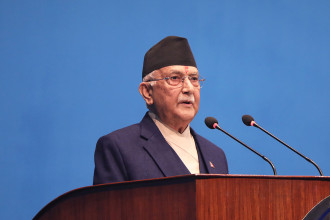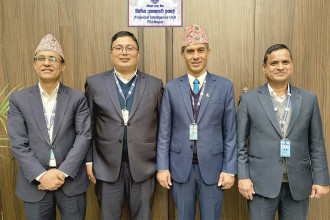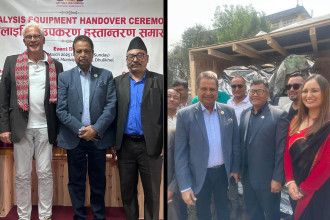KATHMANDU: Nepal Institute for International Cooperation and Engagement (NIICE) on Tuesday organised a talk titled ‘Gendered Disinformation: A threat to democracy’ in Lalitpur.
The talk was organised to discuss how misleading gender and sex-based narratives deter women from participating in the public sphere. More than 50 individuals including civil society members, representatives from different platforms and media persons were present at the event.
“Raising awareness of gendered disinformation among people present in this room is not enough, it is necessary to reach people across Nepal, particularly in rural areas,” said the moderator Rajneesh Bhandari, founder and CEO of Nepal Investigative Multimedia Journalism Network (NIMJN).
Guest speaker Dilrukshi Handunnetti, Founder and Director of Center for Investigative Reporting (CIR), Sri Lanka, shared her insights on the disinformation faced by women entering the public sphere. She highlighted that misleading information often forces women, especially those in political careers, to deny their representation.
Handunnetti further explained, “Women leaders are frequently portrayed as enemies and victims without agency.” She provided examples from Ukraine, India, and Sri Lanka, illustrating how women leaders have been subjected to fabricated sexualised information and images during elections, leading to their defeat.
Data shows that globally 42% of women politicians have encountered extremely humiliating or sexually charged images of themselves online. Political leaders, those who are highly visible in the media and those who advocate for feminist issues have often faced such issues.
Handunnetti, citing some of the international campaigns such as Reclaim the internet and NotTheCost in UK; ByteBack-International Federation of Journalist (IFJ); Web WithoutViolent in Germany, emphasized the importance of advocating for these issues and creating not just an equal but equitable society.
NIMJN founder Bhandari expressed concern about the increasing spread of false and manipulated information intended to harm women and other genders. He emphasised the need for people to be understanding and supportive in bringing these issues to the forefront of media or academic discussions.” He shared an anecdote about a female journalist who said, "I could not continue journalism because I had a child."
The talk, held at the NIICE Seminar Hall in Hattiban, concluded with a Q&A session where participants shared their insights on women's issues and the problems they pose in Nepal.
NIICE is an independent, apolitical and non-partisan think tank based in Nepal working in freedom, democracy and a world free from conflict.





-1743399264.jpg)
